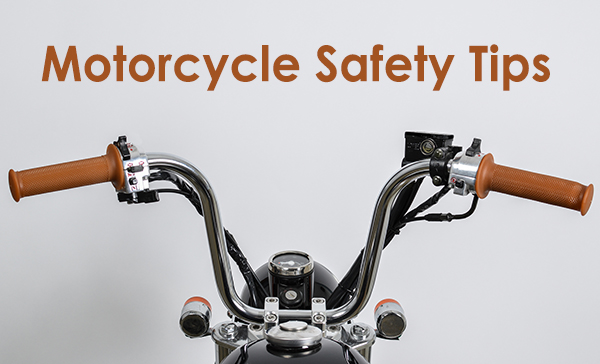There’s nothing like hopping on your motorcycle and cruising down the road on a gorgeous summer day. In fact, there are more bikes on the road during the warmer months than there are during any other time of the year. Unfortunately, that also means there’s a greater risk for motorcycle-related accidents. In other words, motorcycle safety practices are even more important in the summer. The last thing you want is to get into an accident have your Motorcycle Insurance rates spike.
So, before you set out on your next road trip, remember the following tips below and always practice motorcycle safety.
Wear the Right Gear
 In 2012, the National Highway Traffic Safety Administration revealed that 40% of motorcycle riders did not wear helmets while riding. We’re here to tell you that you should always be wearing your helmet! It’s the only that that protects your head from the pavement if you get into an accident. Additionally, the Centers for Disease Control explained that the majority of non-fatal motorcycle accident-related injuries in the U.S. affect the legs, feet, head and neck. These areas are all vulnerable during a motorcycle accident and they need to be protected with a quality DOT-approved helmet for optimal safety. Also, make sure you’re wearing the proper motorcycle attire and boots that cover your ankles.
In 2012, the National Highway Traffic Safety Administration revealed that 40% of motorcycle riders did not wear helmets while riding. We’re here to tell you that you should always be wearing your helmet! It’s the only that that protects your head from the pavement if you get into an accident. Additionally, the Centers for Disease Control explained that the majority of non-fatal motorcycle accident-related injuries in the U.S. affect the legs, feet, head and neck. These areas are all vulnerable during a motorcycle accident and they need to be protected with a quality DOT-approved helmet for optimal safety. Also, make sure you’re wearing the proper motorcycle attire and boots that cover your ankles.
Prepare Your Bike
Before you pull your bike out of the garage, look it over to ensure everything is working properly. Check the oil, lights, signals, brakes, cables and lube chain. Also, ensure that the tires have plenty of tread and are properly inflated. Under-inflated tires can diminish steering ability and cause an accident.
Practice Defensive Driving
 Motorcycles are small and agile, making them less obvious to other drivers than cars. In collisions that involve both a motorcycle and a car, it’s the driver’s fault 3 out of 5 times. Keep this in mind as you drive by watching for cars entering the roadway and being cautious before pulling into an intersection. Remember, more people than ever are practicing distracted driving, including eating, texting or talking on the phone while behind the wheel. Be judicious around other vehicles, and always use your turn signals when riding. It’s also best not to lane-split as to avoid getting hit by a vehicle trying to switch lanes.
Motorcycles are small and agile, making them less obvious to other drivers than cars. In collisions that involve both a motorcycle and a car, it’s the driver’s fault 3 out of 5 times. Keep this in mind as you drive by watching for cars entering the roadway and being cautious before pulling into an intersection. Remember, more people than ever are practicing distracted driving, including eating, texting or talking on the phone while behind the wheel. Be judicious around other vehicles, and always use your turn signals when riding. It’s also best not to lane-split as to avoid getting hit by a vehicle trying to switch lanes.
Avoid Riding in Poor Weather Conditions
Rain and fog always make for riskier riding conditions. Precipitation of any kind dampens the roadways, making them slippery and more difficult to navigate. Not to mention, both rain and fog reduce driver visibility. That means other motorists are less likely to see you when driving which, of course, is a bad thing. If you must ride in the rain or fog, it’s best to wear bright clothing, to avoid speeding and to avoid making any sudden maneuvers.
Keep Your Motorcycle Insurance Up-to-Date
Motorcycle Insurance is a legal requirement in 47 states, with varying minimums depending on that state’s laws. No matter what state you live in, it’s important to carry Liability Insurance, Comprehensive and Collision Insurance and Personal Injury Insurance. Carrying none or only the bare minimum Motorcycle Insurance is riskier than it is expensive. You never know when you may get into an accident, and you don’t want to have to pay for any injuries or damages out of your own pocket.
Call A Motorcycle Insurance Specialist
If you’re concerned about the cost of Motorcycle Insurance, call one of our Insurance Specialists at (855) 919-4247 for a free quote and low rates in minutes. Our agents will see if you qualify for any discounts. They’ll also let you know if you can bundle your insurance policies together for a price-break. In the long run, carrying a Motorcycle Insurance policy will probably be beneficial to you. Nowadays, you can even carry your proof of insurance on your phone, too.
The information in this article is obtained from various sources. This content is offered for educational purposes only and does not represent contractual agreements. The definitions, terms and coverages in a given policy may be different than those suggested here. Such policy will be governed by the language contained therein, and no warranty or appropriateness for a specific purpose is expressed or implied.



